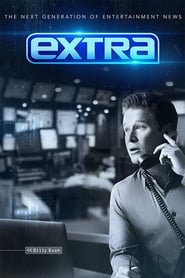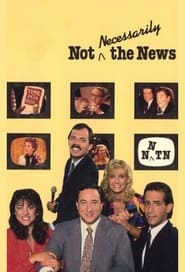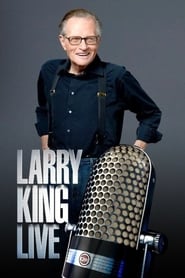News TV Series - Page 13
-
Extra
1994
Extra
1994
star 3.1Extra is an American entertainment television news program covering events and celebrities which debuted on September 5, 1994 in syndication. It was initially produced at Victory Studios in Glendale, California by Telepictures Productions in association with Warner Bros. Television Distribution. From 1995-2003 it was distributed by Time-Telepictures Television a joint merger between Time Magazine and Telepictures. Extra also had a spinoff show called Celebrity Justice, which ran for only three seasons from 2002–2005. Extra is one of two Warner Bros. Television shows to be syndicated to NBCUniversal television stations, the other being The Ellen DeGeneres Show. Extra is also one of two WBTV entertainment programs, the other being TMZ on TV. -
How's Your News?
2009
How's Your News?
2009
How's Your News? is an American television series and also a feature film. It aired Sundays on MTV in the United States, and the feature film based on the same concept was released in 2003. It stars a group of reporters with developmental disabilities who interview celebrities and politicians. It is the continuation of a documentary film project started in 1999 by Arthur Bradford at Camp Jabberwocky in Martha's Vineyard, which was made into a movie of the same name and shown on HBO in 2003. South Park creators Trey Parker and Matt Stone serve as the show's executive producers. Season One had a total of 6 episodes. According to the "How's Your News?" website on April 9, 2009, the show has not been renewed for a second season on MTV, stating: "The decision had little to do with the quality of the series, which was one of the most enthusiastically received and best reviewed programs on mtv this year. It’s just a tough financial time and mtv needed to keep pushing for higher ratings with other shows. Also, we a -
We're Live
2020
We're Live
2020
star 1.5On est en direct is the place where we talk about news and culture, where we host singers, actors, writers, and where surprises, and humor are par for the course! It's freedom of speech, with guests coming to speak on the news for debates without filter. It's also an opportunity to discover new talents ... -
Not Necessarily the News
1983
star 6.2Not Necessarily the News is a satirical sketch comedy series that first aired on HBO in September 1982 as a comedy special, and then ran as a series from 1983 to 1990. It featured sketches, parody news items, commercial parodies, and humorous bits made from overdubbing or editing actual news footage. It was based on the British series, Not the Nine O'Clock News. Not Necessarily the News was also the birthplace of Rich Hall's sniglets. -
The 11th Hour with Brian Williams
2016
star 9MSNBC’s Brian Williams brings you every late-breaking headline and puts each day into sharp context. -
KLUB
2015
KLUB
2015
-
Blickpunkt Sport
2000
Blickpunkt Sport
2000
-
Abendshow
2017
Abendshow
2017
-
Estúdio i
2008
Estúdio i
2008
-
Vanguard
2006
Vanguard
2006
Vanguard is a television documentary series broadcast on the Current TV television network. Vanguard reported on such issues as the environment, drugs and the effects of globalization and conflict. The focus of most Vanguard episodes is to explore and immerse viewers in global issues that have a large social significance. Unlike sound-bite driven reporting, the show’s correspondents conduct interviews with affected peoples and the regions involved usually being led by a guide and translator who facilitates access. Since Vanguard's subject matter often involved exposés about organized crime, drug trafficking and armed revolts, the correspondents can face significant danger because of their reporting due to unstable political or security situations. Vanguard has received some of the media industry’s highest honors for journalism, including the 69th Annual Peabody Award, given for excellence in electronic media, and the 2010 Television Academy Honor, which recognizes "achievements in programming t -
Larry King Live
1985
Larry King Live
1985
star 4.8Larry King Live is an American talk show that was hosted by Larry King on CNN from 1985 to 2010. It was CNN's most watched and longest-running program, with over one million viewers nightly. -
Have I Got News for You
2024
star 5.5Host Roy Wood Jr. and team captains Amber Ruffin and Michael Ian Black serve up a smart take on the news of the week and guide guests through comic games and panels that test their knowledge of current events. -
The ½ Hour News Hour
2007
The ½ Hour News Hour
2007
star 3The 1/2 Hour News Hour was an American television news satire show that aired on the Fox News Channel. The program presented news stories from a conservative perspective, using a satirical format pioneered by Saturday Night Live's Weekend Update, This Hour Has 22 Minutes, and The Daily Show. The first pilot aired on February 18, 2007, and the second on March 4, 2007. Fox News Channel later purchased 13 more episodes of the show, which started airing on May 13, 2007. The show was cancelled and the final episode aired on September 23, 2007. Cast and crew of the show included Kurt Long, Jennifer Robertson, Manny Coto, and Ned Rice. Longtime Weekend Update anchor Dennis Miller was a regular contributor to the program with his "The Buck Starts Here" segment. -
Sportclub
2000
-
Rick Mercer Report
2004
Rick Mercer Report
2004
star 7.2A weekly helping of topical satire, funny takes on the week's top stories and Canada-wide adventures. -
VH1 Goes Inside
2003
-
Sport im Dritten
2000
Sport im Dritten
2000
-
WHIH Newsfront
2015
WHIH Newsfront
2015
star 6WHIH Newsfront is a television program presented by Christine Everhart in the WHIH World News network, informing about major events from political, scientific, and entertainment news, in the Marvel Cinematic Universe. -
Inside MMA
2007
Inside MMA
2007
star 8Inside MMA on Mark Cuban's HDNet television network combines the strengths of the best news and sports programs on television to go deeper into the world of mixed martial arts than any other show can. A combination of talk, highlights, analysis and in-depth reporting allow the show to cover the fighting world from every angle. Since its inception in 2007, “Inside MMA” has pioneered mixed martial arts coverage and is credited with helping one of the fastest growing sports in the world continue it’s massive growth and gain mainstream acceptance. Award winning sports reporter, Kenny Rice, co-hosts with former UFC heavyweight champion and King of Pancrase, Bas Rutten, as they welcome the biggest personalities in MMA. The humor and enthusiasm of Rutten and his years of experience as a premiere fighter and coach compliment Rice and his hard-nosed journalistic style that doesn’t shy from the many controversies that surround the sport.










